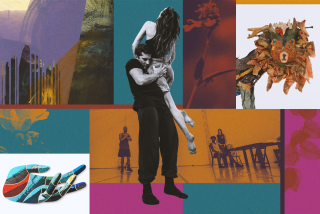MUSIC AND DANCE : Colleges Offer Abundance Of Class Acts
The complete preludes of Chopin, music by Ginastera, choreography attributed to modern dance pioneer Ruth St. Denis . . .
These are not programs you’ll find on any highly promoted local concert series. But they are programs available to you, thanks to one of the best-kept secrets in the county: Colleges and universities can be among the most rewarding artistic resources for residents interested in music and dance.
These institutions regularly bring in guest artists to give programs and also to share their expertise and insights in master classes, not only for students but very often for public auditors.
They frequently house specialists in areas that might not draw enough people to fill a 3,000-seat auditorium, but are nonetheless crucial to the continuity and development of the art.
And, maybe best of all, many of these events are free or cost very little.
Several such programs this week will provide Orange County music and dance aficionados with opportunities for expanding their knowledge and enjoyment.
Among them:
--Irvine Valley College Prof. Thomas Lymenstull will discuss and perform Chopin’s Preludes, Opus 28 at 8 p.m. Saturday on the campus, in Room 311 of Building A300.
--Argentine pianist Eduardo Delgado will give a lecture-recital on his compatriot, composer Alberto Ginastera, at 1 p.m. and a master class on the “Bel Canto of Piano” at 3:30 p.m. Saturday in Room 118 of the Performing Arts Building at Cal State Fullerton.
--UC Irvine dance professor Olga Maynard, who is also an associate editor of “Dance Magazine,” will give a free lecture on “Ruth St. Denis: Woman and Dancer” at 7 p.m. Tuesday in the UC Irvine Fine Arts Concert Hall. Reconstructions of dances from the St. Denis repertory, performed by Karoun Tootikian , Lalla Lezli and former members of the St. Denis Dancers, 1945-65, will be featured.
In a recent interview, Lymenstull said he picked the 24 Chopin Preludes because they are “exemplary of the depth and breath of Chopin’s style. There is a tremendous variety of character and color in these works, and the collection as a whole mirrors what is the very best of Chopin’s style and his music.
“Chopin composed the preludes during a tumultuous period for him,” continued Lymenstull, whose lecture will include discussion of the composer’s life and times. “He completed them in Majorca, which was a disaster for his health and well-being for the rest of his life.”
Lymenstull said Chopin had sought out the balmy island because his health was failing. “But the weather on Majorca turned out to be anything but balmy. So he and George Sand moved back to the mainland, and Chopin stayed in a monastery. But the villagers became afraid of him because of his persistent cough. They feared it was tuberculosis. So (Chopin and Sand) were outcasts.”
But in a sense, Lymenstull added, being away from people was nothing new for Chopin. “He was very much of a recluse. He gave only about 30 public performances in his whole life and spent most of his time teaching and composing. Yet he had stellar fame as a performer. . . . He would play in salons for his close associates and his friends, but not at formal concerts for the public.”
Lymenstull said that while the cycle of 24 Preludes--one in every key--suggests the pattern in Bach’s “Well-Tempered Clavier,” the purpose of the Chopin pieces is quite different.
“The point is that they are not necessarily a prelude to something,” Lymenstull said. “With Bach, the preludes were preludes to a fugue. Chopin’s are little character pieces of their own. Each generates a particular kind of atmosphere or imparts a particular character in a rounded and complete way.
“The range of character is wide--from mysterious to gentle to frenetic. . . . In some ways, they are almost a catalogue of emotional characters, which makes them a gratifying group to play.”
Ever mindful of academic caution toward such a descriptive approach, Lymenstull added a caveat:
“Bear in mind that we’re indulging in a kind of romantic crossing of metaphors that Chopin himself would probably not have approved of.”
In his talk, Lymenstull will give examples of how Chopin’s style and genius come through in specific details. An especially intriguing aspect: He will provide alternative ways of ending a phrase or a piece and will suggest why the composer made the choices he did.
“But I don’t intend to be technical,” he said. “My intention is to concentrate on things that really will help an average or interested piano music-loving listener to enjoy the preludes more, and understand them better.”
Tickets for the Lymenstull lecture-performance are $3 for adults and $2 for students and seniors. For reservations and information, call (714) 559-3333.
Tickets are $10 for each of Eduardo Delgado’s presentations at Cal State Fullerton on Saturday, or $18 for both. Students younger than 19 may attend both for $2. The events are being co-sponsored by the Orange branch of the Music Teachers Assn. of California (MTAC) and the college’s Music Deptartment . For information, call Mary P. Costa at (714) 838-2988.
For information on Olga Maynard’s free lecture at UC Irvine on Tuesday, call (714) 856-7284.
More to Read
The biggest entertainment stories
Get our big stories about Hollywood, film, television, music, arts, culture and more right in your inbox as soon as they publish.
You may occasionally receive promotional content from the Los Angeles Times.










